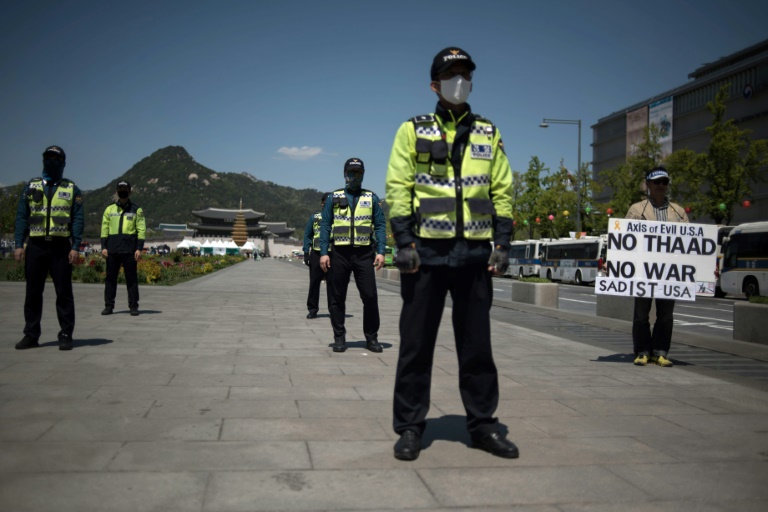
Beijing has slapped a series of measures on South Korean firms and banned tour groups going to the country in moves seen as economic retaliation for the deployment of the US Terminal High Altitude Defense (THAAD) system © AFP/File / Ed JONES
Seoul, Korea, Republic of, Oct 31 – South Korea and China tried Tuesday to improve a relationship strained by a US missile defence system, issuing strikingly similar statements, and with Seoul saying their leaders would hold talks on the sidelines of next week’s APEC summit.
The nations have been at loggerheads over the deployment in South Korea of the US Terminal High Altitude Area Defense (THAAD) system, which Seoul and Washington say is intended to defend against missile threats from nuclear-armed North Korea.
China sees it as a threat to its own military capabilities. It has slapped a series of measures on South Korean firms and banned tour groups from going to the country in moves seen as economic retaliation.
China is South Korea’s biggest trading partner and its measures have had a big impact on some of the South’s biggest companies, including retail conglomerate Lotte — which provided a golf course used for the THAAD deployment — and carmaker Hyundai.
But in virtually identical statements issued by their foreign ministries, the two countries — Asia’s number one and number four economies — said they had agreed to address China’s concerns over THAAD through future discussions.
“The two sides agreed to communicate through the channels of the two armed forces on the THAAD issues of concern to the Chinese side,” said the statement from Beijing.
“The two sides attach great importance” to their bilateral relations, it added, and agreed to increase cooperation in various fields “in order to return to a normal development track”.
South Korean President Moon Jae-In and Chinese leader Xi Jinping will have a summit on the sidelines of the APEC gathering in Danang, Vietnam, Seoul’s presidential office said.
“The agreement to hold the summit is the first step… to restore bilateral cooperation and exchanges in all areas to a normal path,” said Nam Gwan-Pyo, Seoul’s deputy director of national security.
It follows a similar meeting in Berlin in July before the G20 summit.
But there were indications that negotiations on THAAD might not be so smooth.
South Korea’s foreign ministry said in its statement that Beijing had expressed its “concern” over the deployment, as well as over Seoul’s military cooperation with Washington and Tokyo.
“The Korean side reiterated its positions that it had publicly stated” while China “hoped that the Korean side would deal with related issues appropriately”, it added.
South Korean Foreign Minister Kang Kyung-Wha told parliament on Monday that Seoul would not form a trilateral military alliance with Washington and Tokyo and there would be no additional deployments of the THAAD system.
In response, China’s foreign ministry spokeswoman Hua Chunying said Tuesday there was “no change” in Beijing’s position on the THAAD issue.
She hoped Seoul “can match its words with actions and properly deal with the THAAD issue”
About The Author








































